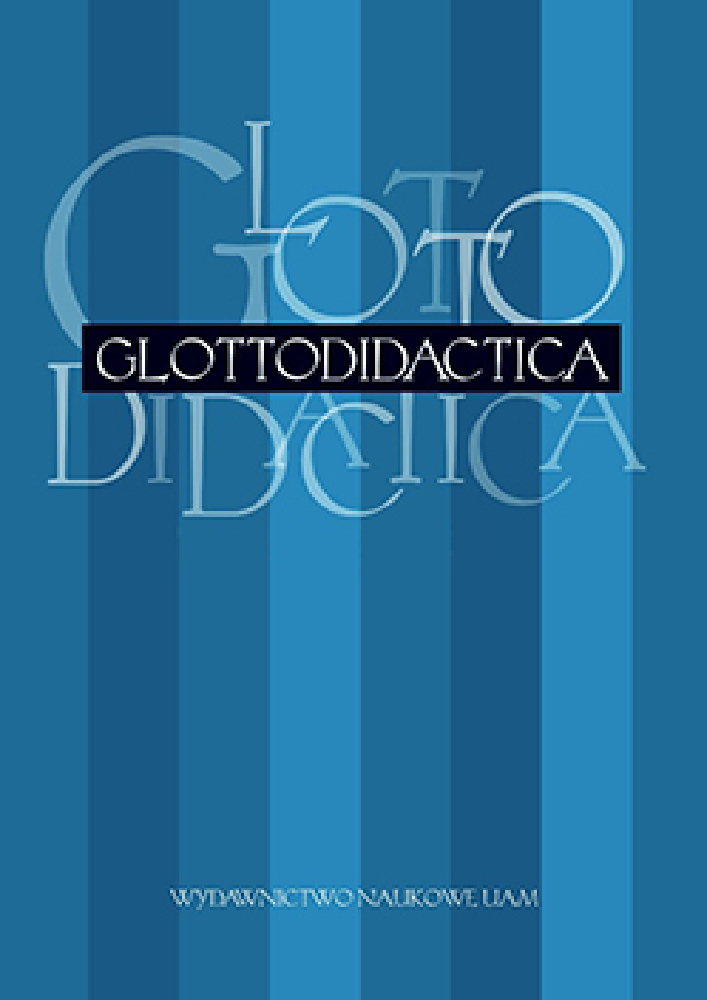Résumé
This paper focuses on the lexical side of the emergency communication of German paramedics who are learning Polish as a foreign language for professional purposes. The aim of the study is to find out which lexical units arise during language courses and how often. To what extent can the acquired vocabulary be used to develop dedicated programmes for foreign language acquisition in medical emergency communication? The analysis shows that the vocabulary collected here depends on the subject, such as ból (pain) or leki (medicines). According to the participants, symptomy (symptoms) and duszności (shortness of breath) are also part of the common vocabulary. Emergency medical communication can be carried out with the question pronouns kiedy (when) and gdzie (where). Among the most frequently repeated lexical units of vital parameters during patient transfer are saturacja (oxygen saturation) and puls (pulse). The vocabulary collected here should help in preparing a description of the competences which should form part of a language course for professional purposes.
Références
Albert, R. / Marx, N. (2016). Empirisches Arbeiten in Linguistik und Sprachlehrforschung. Anleitung zu quantitativen Studien von der Planung bis zum Forschungsbericht. Tübingen: Narr.
Chłopicka-Wielgos, M. / Pukas-Palimąka, D. / Turek-Fornelska, K. (2015). Co Panu dolega? Podręcznik rekomendowany przez Centrum Języka i Kultury Polskiej w Świecie Uniwersytetu Jagiellońskiego do nauczania cudzoziemców języka polskiego na studiach medycznych. Kraków: FWKiJP im. Mikołaja Reja.
Fluck, H.R. (1992). Didaktik der Fachsprachen: Aufgaben und Arbeitsfelder, Konzepte und Perspektiven im Sprachbereich Deutsch. Tübingen: Narr.
Gajewska, E. (2015). Poziomy biegłości a nauczanie języków specjalistycznych. In: S. Piotrowski (Hrsg.), O nauczaniu i uczeniu się języka obcego dla potrzeb zawodowych (S. 10–21). Lublin: Werset.
Gębal, P.E. / Kołsut, S. (2019). Zur Berufsorientierung des Fachsprachenunterrichts im mitteleuropäischen Kontext. Von den Arbeitsmarkterwartungen zu den berufsspezifischen Sprachkompetenzprofilen. Studia Neofilologiczne, XV, 61–71. http://dx.doi.org/10.16926/sn.2019.15.05 [Zugriff am: 25.10.2020].
Gębka-Wolak, M. (2011). Przygotowanie lektorów do nauczania języka specjalistycznego. In: K. Pluskota / K. Taczyńska (Hrsg.), Nowe perspektywy w nauczaniu języka polskiego jako obcego II (S. 303–320). Toruń: Wydawnictwo Naukowe UMK.
Gębka-Wolak, M. (2016). Gramatyka w nauczaniu języka polskiego do celów specjalistycznych. In: E. Baglajewska-Miglus / T. Vogel (Hrsg.), Fachsprachenunterricht: Lernen und Lehren am Beispiel des Polnischen als Fremdsprache / Nauczanie języka specjalistycznego: Nauczanie i uczenie się na przykładzie języka polskiego jako obcego (S. 9–24). Aachen: Shaker Verlag.
Grucza, S. (2010). Sprache(n) – Fachsprache(n) – Fachsprachendidaktik. Studia Germanica Gedanensia, 22, 31–46.
Hryniewicz, J. / Lisek, G. (2019). Nauka języka sąsiada: od kształcenia przedszkolnego do zawodowego. Rozwiązania dydaktyczne i organizacyjne na Pomorzu Przednim. In: K. Zioło-Pużuk (Hrsg.), Panorama glottodydaktyki polonistycznej. Wyzwania, pytania, kierunki (S. 149–162). Warszawa: Wydawnictwo UKSW.
Kósa, G. (2019). Lexikalische Kompetenz im schulischen Fremdsprachenunterricht. Werkstatt, 14, 30–42.
Lisek, G. (2018). Wie motiviere ich Teilnehmer bei einem ELearningFachsprachenkurs? Reflexionen zum ELearning für einen PolnischFachsprachenkurs für Rettungskräfte. In: E. Baglajewska-Miglus / T. Vogel (Hrsg.), Polnisch als Fremd und Zweitsprache, Band 4: Fachsprache Polnisch – Sprache mit Zukunft. Specjalistyczny język polski – język z przyszłością (S. 106–112). Aachen: Shaker Verlag.
Lisek, G. (2019). Fachkommunikation und regionale Vernetzung am Beispiel des Projekts Integrierter grenzüberschreitender Rettungsdienst Pomerania / Brandenburg (InGRiP). Greifswalder Beiträge zur Hochschullehre. Perspektiven der Lehre im 21. Jahrhundert, 10, 21–32.
Lisek, G. (2020). Notfallmedizinische Kommunikation im Unterricht Polnisch als Fremdsprache. Analyse von Gesprächsverhalten deutschsprachiger Rettungskräfte. Glottodidactica. An International Journal of Applied Linguistics, XLVII (2), 171–195.
Majewska-Wójcik, A. / Račáková, A. / Smoleń-Wawrzusiszyn, M. / Olchowa, G. (2016). Dwujęzyczny podręcznik komunikacji językowej dla służb ratowniczych pogranicza polskosłowackiego. Lublin: Wydawnictwo KUL.
Roche, J. (2013). Fremdsprachenerwerb – Fremdsprachendidaktik. Tübingen, Basel: Francke.
Searle, J.R. (1997). Sprechakte: ein sprachphilosophischer Essay. Frankfurt (a. M.): Suhrkamp.
Seretny, A. (2010). Rozwijanie kompetencji leksykalnej uczących się poprzez obcowanie z tekstem. Acta Universitatis Lodziensis. Kształcenie Polonistyczne Cudzoziemców, 17, 547–579.
Seretny, A. (2017). Leksyka w nauczaniu języka specjalistycznego – potrzeby akademickie a potrzeby zawodowe. Acta Universitatis Lodziensis. Kształcenie Polonistyczne Cudzoziemców, 24, 149–166.
Stemmler, J. / Hecker, U. (2017). Notfallkommando Kommunikation in Notfallsituationen für Gesundheitsberufe. Berlin, Heidelberg: Springer.
Targońska, J. (2011). Lexikalische Kompetenz – ein Plädoyer für eine breitere Auffassung des Begriffs. Glottodidactica. An International Journal of Applied Linguistics, XXXVII, 117–127.
Targońska, J. (2014). Lexikalische Strategien der Germanistikstudierenden zu ihrem Studienbeginn. Lingwistyka Stosowana, 9, 171–200.
Licence
 This work is licensed under a Creative Commons Attribution-NoDerivatives 4.0 International License.
This work is licensed under a Creative Commons Attribution-NoDerivatives 4.0 International License.
Authors
Authors of texts accepted for publication in Glottodidactica are required to complete, sign and return to the Editorial team’s office the Agreement for granting a royalty-free license to works with a commitment to grant a CC sub-license.
Under the agreement, the authors of the texts published in Glottodidactica grant Adam Mickiewicz University in Poznań a non-exclusive, royalty-free license and authorize the use of Attribution-NoDerivatives 4.0 International (CC BY-ND 4.0) Creative Commons sub-license.
The authors retain the right to the free disposal of the work.
Users
Interested Internet users are entitled to use works that have been published in Glottodidactica since 2016, under the following conditions:
▪ attribution – obligation to provide, together with the distributed work, information about the authorship, title, source (link to the original work, DOI) and the license itself.
▪ no derivatives – the work must be preserved in its original form. Without the author's consent, it is not possible to distribute the modified work in the form of translations, publications, etc.
Copyrights are reserved for all texts published before 2016.
Miscellaneous
Adam Mickiewicz University in Poznań retains the property right as a whole (layout, graphic form, title, cover design, logo etc.).
Privacy statement
The names and email addresses published on this journal site will be used exclusively for the purposes declared by this journal and cannot be used for any other purpose or by any other party.





